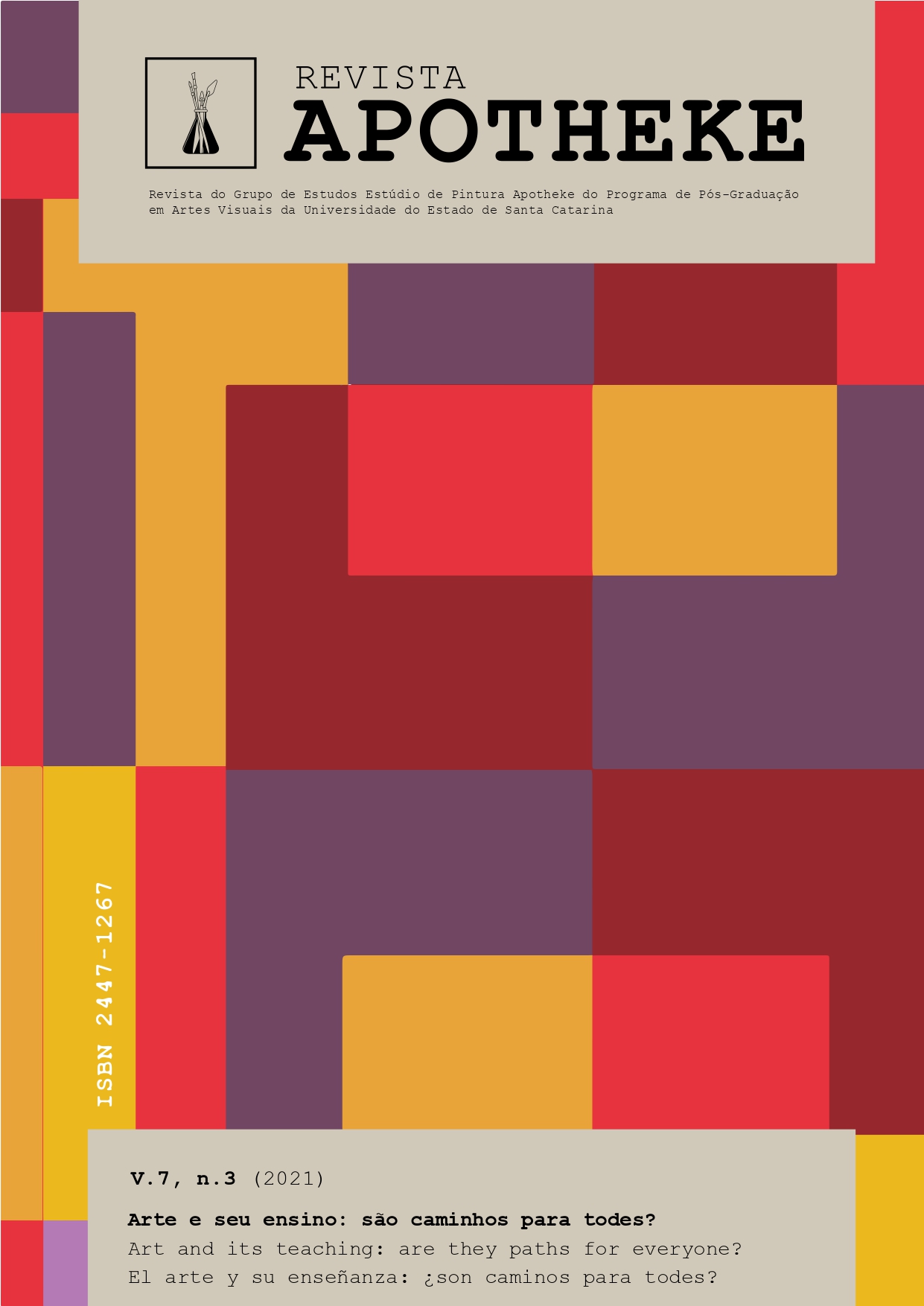Ampliando repertórios e imaginários a partir da reflexão de uma abordagem pedagógica não hegemônica para o Ensino de Artes Visuais
DOI:
https://doi.org/10.5965/24471267732021054Palavras-chave:
Ensino de Artes Visuais, Estudos Decoloniais, Pedagogia das VisualidadesResumo
Existe uma insistente abordagem de (re)produções de discursos, visualidades e ideologias hegemônicas nos livros didáticos e nos currículos ofertados para o ensino de artes, fortalecendo assim, o imaginário excludente e preconceituoso acerca dos produtos culturais de outras temporalidades e regionalidades, que não as euro-norte-americanas e produções de artistas mulheres. Para tanto, neste trabalho buscamos refletir sobre caminhos possíveis de construir uma educação artística anti-racista, anti-machista, decolonial, horizontalizada, consciente sobre os preconceitos em relação à classe, gênero, raça, etnia, dentre outras diversidades, propondo uma mudança social e ampliação da visão de mundo. Analisamos os trabalhos da artista Gê Viana como uma possibilidade pedagógica que contribua para uma educação fortalecedora de sua criticidade e autonomia na construção de identidade e visão de mundo não hegemônicas. Consideramos, então, que a abordagem pedagógica é uma escolha política dos professores, podendo de traçar ou não, análises e reflexões com os alunos acerca dos contextos, intencionalidades, (re)construções contida das imagens, além de criar possibilidades para a ampliação do repertório visual e imagético. Sendo assim, os trabalhos da artista Gê Viana podem ser um caminho possível para trabalhar as questões de gênero, raça, história, entre outros, que ainda são pouco fortalecidas na história da arte e no seu ensino.
Downloads
Referências
BERNARDINO-COSTA, Joaze; MALDONADO-TORRES, Nelson; GROSFOGUEL, Ramón. Introdução. Decolonialidade e pensamento afro diaspórico. In: BERNARDINO-COSTA,Joaze; MALDONADO-TORRES, Nelson; GROSFOGUEL, Ramón (org.). Decolonialidade e pensamento afro diaspórico. Belo Horizonte: Autêntica, 2020. p. 9-26.
BRASIL. Ministério da Educação. Base Nacional Comum Curricular. Brasília, 2018. Disponível em: http://basenacionalcomum.mec.gov.br/abase/. Acesso em: 09 nov. 2021.
BRUM, Eliane. A menina quebrada: e outras colunas de Eliane Brum. 1. ed. Porto Alegre: Arquipélago, 2013.
hooks, bell. Olhares negros: raça e representação. 1. ed. São Paulo: Elefante, 2019.
KILOMBA, Grada. Memórias da plantação: episódios de racismo cotidiano. 1. ed. Rio de Janeiro: Cobogó, 2019.
FREIRE, Paulo. Pedagogia dos sonhos possíveis. Ana Maria Araújo Freire (org.). 1. ed. São Paulo: Editora UNESP, 2001.
LEMOS, Beatriz. Catálogo Prêmio PIPA - Prize 2020 A janela para a arte contemporânea brasileira 2020. Instituto Pipa, Rio de Janeiro, v.11, p. 26-49, 2020. Disponível em: https://www.premiopipa.com/. Acesso em: 09 out. 2021.
LUGONES, María. Rumo a um feminismo descolonial. Estudos Feministas, Florianópolis, v. 22, n.3, p. 935 - 952, nov. 2014.
NOCHLIN, Linda. Por que não houve grandes mulheres artistas? 1. ed. São Paulo: Edições Autora/ Publication Studio São Paulo, 2016. Tradução de Juliana Vacaro.
MANHATTAN, Agrippina. Por que não houve grandes mulheres travestis?. Revista Desvio, Rio de Janeiro, v. 2 ,n. 3, p. 94-98, nov. 2017.
OLIVEIRA, Tory. Como abordar a história das mulheres durante todo o ano? Nova Escola, 2019. Disponível em: https://novaescola.org.br/conteudo/16097/como-abordar-a-historia-das-mulheres-durante-todo-o-ano. Acesso em: 04 set. 2021.
PEDROSA, Stella; COSTA, Ana Valéria de Figueiredo da. Fotografia e educação: possibilidades na produção de sentidos dos discursos visuais. Nuances: estudos sobre Educação, São Paulo, v. 28, n. 1, p. 78-94, abr. 2017.
SARDELICH, Maria. Leitura de imagens, cultura visual e prática educativa. Cadernos de Pesquisa, São Paulo, v.36, n.128, p.451 - 472, ago, 2006.
SILVA, Tomaz Tadeu da. Documentos de identidade: uma introdução às teorias
do currículo. 1. ed. Belo Horizonte, Autêntica, 1999.
VICTORIO FILHO, Aldo; PINTO, Maria. Um pouco mais sobre as imagens visuais na educação e na cultura visual contemporâneas. Revista Digital do LAV, Santa Maria, vol. 11, n. 1, p. 179-191, 17 set. 2015.
Downloads
Publicado
Como Citar
Edição
Seção
Licença
Copyright (c) 2022 Lisa Miranda, Thamires Burlandy, Ana Valéria de Figueiredo

Este trabalho está licenciado sob uma licença Creative Commons Attribution-NonCommercial 4.0 International License.
Os autores de trabalhos submetidos à Revista APOTHEKE autorizam sua publicação em meio físico e eletrônico, unicamente para fins acadêmicos, podendo ser reproduzidos desde que citada a fonte. Os mesmos, atestam sua originalidade, autoria e ineditismo.
Os artigos publicados pela revista são de uso gratuito, destinados a aplicações
acadêmicas e não comerciais. Os direitos autorais são todos cedidos à revista. Os artigos cujos autores são identificados representam a expressão do ponto de vista de seus autores e não a posição oficial da Revista Apotheke. O(s) autor(es) se compromete(m) a sempre que publicar material referente ao artigo publicado na Revista Apotheke mencionar a referida publicação da seguinte forma:
"Este artigo foi publicado originalmente pela revista Apotheke em seu volume (colocar o volume), número (colocar o número) no ano de (colocar o ano) e pode ser acessado em: http://www.revistas.udesc.br/index.php/APOTHEKE/index"
É responsabilidade dos autores a obtenção da permissão por escrito para usar em seus artigos materiais protegidos pela Lei de Direitos Autorais. A revista Apotheke não é responsável por quebras de direitos autorais feitas por seus colaboradores.
Os autores mantêm os direitos autorais e concedem à revista o direito de primeira publicação, com o trabalho licenciado sob Licença Creative Commons do tipo atribuição BY-NC:
Atribuição (BY): os licenciados têm o direito de copiar, distribuir, exibir e executar a obra e fazer trabalhos derivados dela, conquanto que deem créditos devidos ao autor ou licenciador, na maneira especificada por estes.
Uso Não comercial (NC): os licenciados podem copiar, distribuir, exibir e executar a obra e fazer trabalhos derivados dela, desde que sejam para fins não comerciais.
Após a publicação dos artigos, os autores permanecem com os direitos autorais e de republicação do texto.




